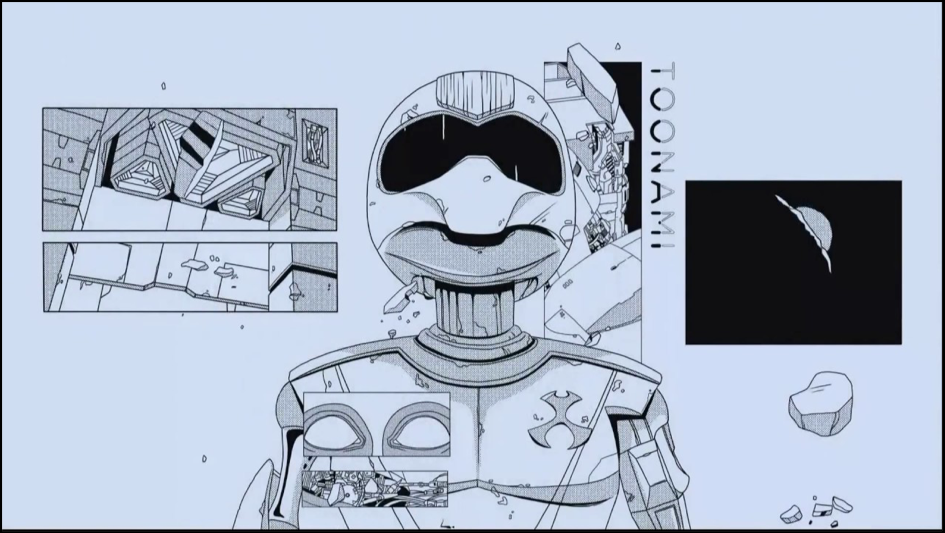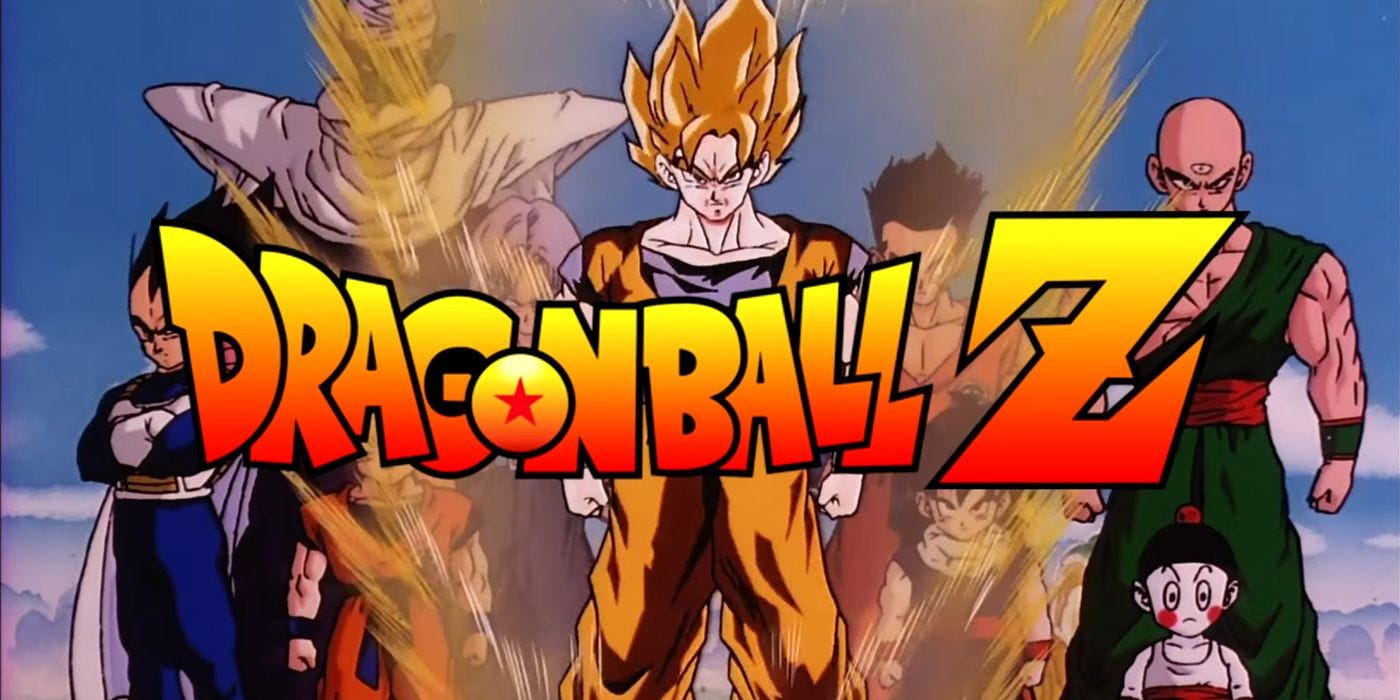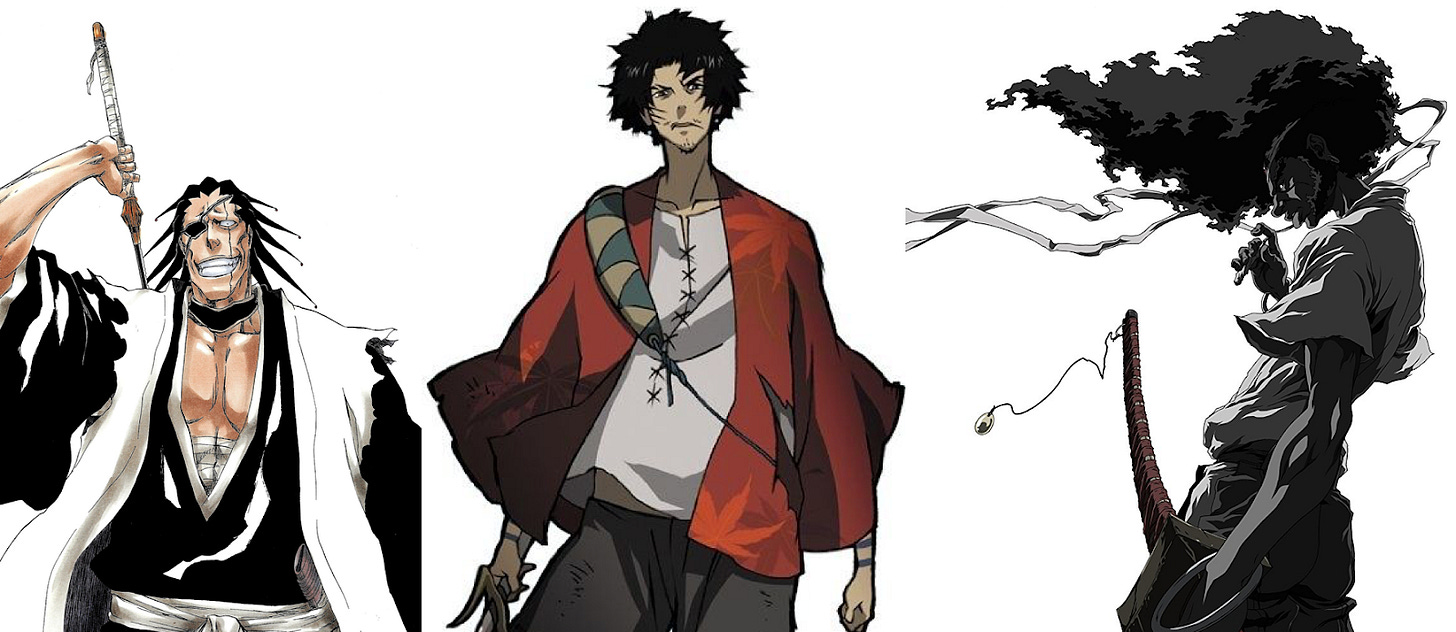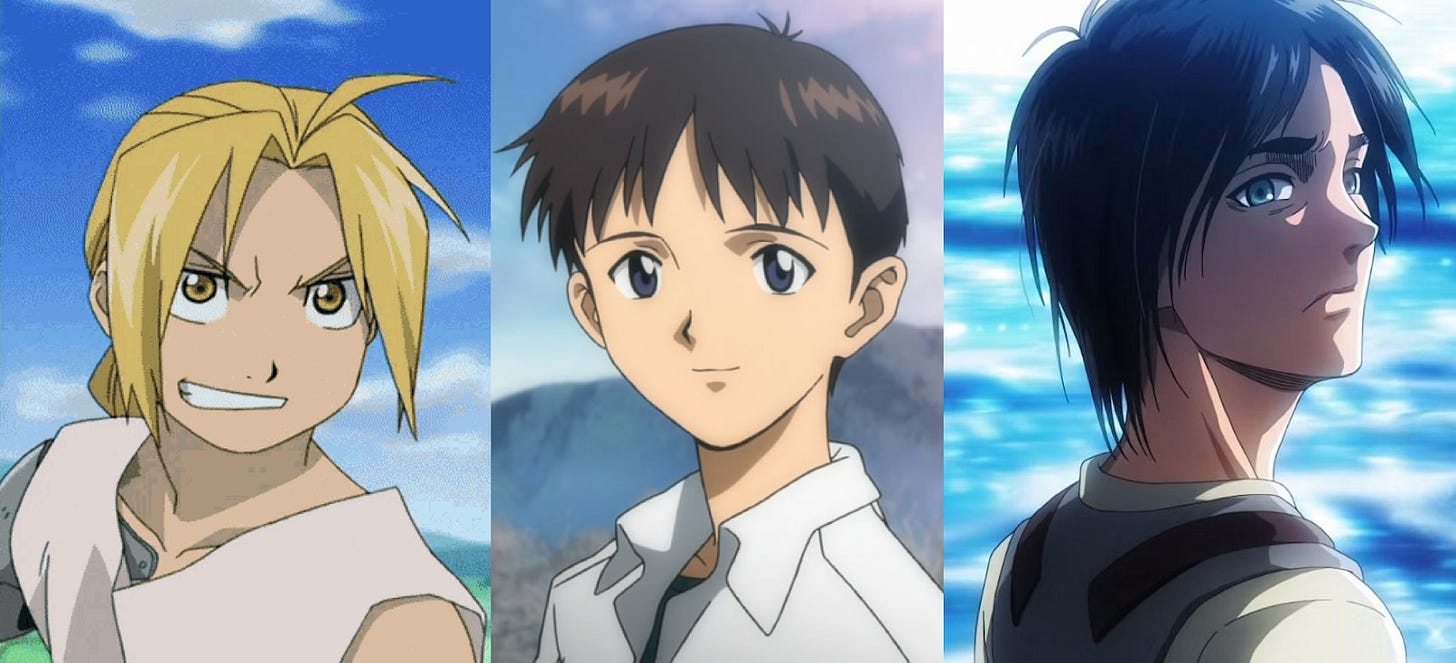Ink In The Cel is a fictional TV programming block, where myself and Ricky Denham curate our favorite anime in the spirit of Toonami, Adult Swim and other legendary TV segments from back-in-the-day. Enjoy!
Dragon Ball Z
John
It’s January 2006. Kobe has just finished single-handedly destroying the Toronto Raptors and it’s time to watch another example of domination. I switch channels and stop to see a man violently shrugging his shoulders against a dark green backdrop. It's as if he’s convulsing. A cocktail of rage and hysteria coursing through his veins.
Lightning strikes, blending in perfectly with the shivery sounds of a Midwestern winter. A burst of yellow light comes across the screen, as if the Greek king of the gods himself decided to ordain this moment. And then you hear it. The scream to ignite a thousand suns. Black becomes gold, victims become vanquishers and a kid visiting Chicago becomes a lifelong fan of a new medium.
Favorite Saga: “The Cell Saga”
Ricky
The big dog of the shōnen genre. A spirit guide to a generation. Akira Toriyama’s brainchild continues to teach major lessons of war, the sickness of greed, and coping with death.
This world don’t play fair. You gotta work with the best of what you got. But what you thought was your best ain’t even nearly close to what your best can truly be. You learn that your best self can get better and better. Buckets of blood, overbearing sweat, and oceans of tears. What are you willing to sacrifice for the sake of your village?
Somebody sees something that you possess. It’s a gift from the most high. An honorable gift. Your enemies secretly admire you for your powers and beautiful setting. All of it is admirable. But your enemies will never tell you that. And they damn sure won’t grovel to you. That power that you hold, the lurking bastards from the other side will do anything, by any means necessary, to take it from you and use your family as bait.
You have every right to showcase your rage. Use it. All is fair in love and war. And best believe you’re gonna get hurt. But we believe that you will win. Don’t forget to have fun too. However when the time comes to get serious, you can’t be playing around. The world around you and the world within you is at stake. Go on, kid. Make the people proud.
Favorite Saga: “The Frieza Saga”
Blades Of Blood
In the classic manga Lone Wolf And Cub, a grieving father gives his infant son two options: pick up the sword and join him on his quest for revenge or pick up the ball and join his wife in the afterlife. The son makes his decision and, like his father, is instantly doomed to a life of blades and bloodshed.
The sword is a weapon, a tool that takes lives, no matter how well-intentioned or noble the wielder is. The moment you pick up a sword, you are destined to follow a particular way of life, one that invites competition and violence. Live by the sword, die by the sword, there is no other option.
Afro Samurai (2007) – Ricky
“Nothing personal. It’s just revenge.”
Is revenge the ultimate currency to balance justice? Is trust the cousin to reputation where it takes years to accumulate and seconds to disintegrate? Does respect require the baggage of fear? Afro’s lifelong mission is set on his philosophy to avenge the death of a loved one and reach the rank of a Number 1 warrior. He has no desire for friendship. Solitude is accompanied by a comic-relief subconscious to his cold demeanor. Steamrolling his enemies is a simple walk in the park. Snowfall, cloudy darkness, or the sun beaming to the grass, Afro couldn’t care less about the weather’s mood. Whether it’s 1-on-1 or 1-on-100, he will slice your confidence without saying goodbye. An ass whooping will be a promise if you dare to block his stroll to the top spot.
Samuel L. Jackson’s criminally underrated voice acting is flawlessly daunting. Jackson also serves as an executive producer. Lucy Liu, Mark Hamill, and Ron Perlman also join this impressive ensemble cast. RZA’s score, of course, fits this Afrocentric series like a well-tailored suit. Joining the canon of other instances of hip-hop blended with the tenets of Eastern combat styles (such as Afu-Ra, The Boondocks, Ghost Dog: The Way Of The Samurai and The Wu-Tang Clan), Afro Samurai is a captivating avant-garde anime that captures the magic of when Black and Asiatic influences collide.
Favorite Episodes: All of them
Bleach (2004) – John
Like any shōnen anime, Bleach has its ups and downs. At its best, Bleach is a show where style meets substance. The style: a pseudo-European aesthetic that is part fashion magazine and part action-adventure novel. The substance: a melancholic ode to fear and friendship. The fear of loss, the fear of succumbing to the darkest version of yourself, the fear of not being strong enough to protect the people you love.
Strip out all the filler, all the fan-service, all the comedy that often falls flat and you get a series that deserves to be mentioned amongst one of the greats. The only question left for fans of the show is if it still has what it takes to stick the landing.
Favorite Arcs: “Soul Society: Rescue”, “Arrancar: Hueco Mundo” and “Thousand-Year Blood War: Blood Warfare”
Samurai Champloo (2004) – Ricky
Three civilians in Japan’s Edo period on a journey to meet an absent father for the purpose of closure. Mugen, an impulsive nomad who is not afraid to pour gasoline on the fire. Jin, a disciplined samurai with stoic bravado and swiftly dangerous whenever provoked. Fuu, a bubbly yet slightly annoying personality who, the aforementioned warriors, are assigned to begrudgingly protect from petty predators and callous criminals. All three travelers consistently get on each other’s nerves but unify against perilous times and external disagreements whenever necessary.
Unlike several anime scores, with the maximalist orchestral sound and / or heavy guitar riffs that evoke themes of triumph, war and epic ‘braveheart’ energy, Samurai Champloo is usually revered because of how it brings hip-hop to the forefront. Mugen’s fighting style uses plenty of freestyle techniques, often adding flips and tumbles similar to how B-boys and B-girls rock. The viewer witnesses DJ-scratching transitions from scene-to-scene. Our main characters strike, stroll and ponder while listening to the elegant beats by the late great godfather of the lo-fi sound: Nujabes.
This is an anime for hip-hop heads by hip-hop heads, and a perfect entry point to a channel that embraced the likes of Madvillainy, Flying Lotus, and Dilla with open arms.
Favorite Episodes: “Tempestuous Temperaments”, “Lullabies Of The Lost, Verse 1 & 2” and “Evanescent Encounter, Part 2 & 3”
Empires Of Lost Innocence
Pressure produces diamonds. Fate is telling you to shine. It demands you to shine, actually. You can’t run away from leadership and you certainly can’t hide from your purpose. But here is the question: do you believe that you are the gem or are you just another crash dummy installed to push civilization forward? Don’t backpedal your steps. The future is in your hands now.
Attack On Titan (2013) – Ricky
With a sheer amount of combustible evidence, faith and science don’t have the best relationship. These two sides often clash and have no problem finding loyal recruits. Historians of both parties will find loopholes to manipulate the narrative. Sacred texts become abused by the worst game of telephone, where heartless invaders target nearby villages and desperate vengeance is placed in the hands of brainwashed soldiers.
We have seen this nasty ruthlessness play out during World War II and we see similar examples of disorder in this epic time-bending saga. Attack On Titan offers an insane amount of character development and ulterior motives shaking the plot line. It is a show where mythology burglarizes purity, death is predestined onto those who may be blessed in high favor and superiority is poisonous to those who succumb to it.
Attack On Titan is a chessboard with checker pieces. A groundbreaking tennis match where the ball is substituted by ticking time bombs. Who will you root for when truth is elusive amongst snakes?
Favorite Episodes: “Hero”, “The Other Side Of The Wall” and “Declaration Of War”
Fullmetal Alchemist: Brotherhood (2009) – John
The older you get, the harder it is to do the right thing.
Fullmetal Alchemist: Brotherhood is a testament to decent people staying true to who they are in indecent times. It’s a reminder that being a good person isn’t easy. It often means looking at a set of bad options and insisting that there must be another way.
With the best set of fight scenes that the medium has to offer, Fullmetal Alchemist: Brotherhood is a heartfelt if, at times, heartbreaking show about love: love of friends, love of family, love of country. A visually striking reminder to do better and that true love comes from sacrificing what we want so that others can get what they need.
Favorite Episodes: “Death Of The Undying”, “Beyond The Inferno” and “The Other Side Of The Gateway”
Neon Genesis Evangelion (1995) – John
Neon. Genesis. Evangelion. Phrased another way, it could be read as the gospel of new beginnings.
What do you do when the world has ended? You try and build another one.
Watching Neon Genesis Evangelion during the midst of a global pandemic was an interesting experience. On the surface, the show is a mecha-anime in the vein of Mobile Suit Gundam and Macross. Dig a little bit deeper though and you find an intense psychological exploration of what it means to be a teenager: the hormones, the insecurity, the incessant need to feel validated and loved.
Neon Genesis Evangelion is a dramatized diary entry detailed with death and destruction. A show that inspires equal amounts of disgust and awe. A show that can only be described through the powerful words of Percy Bysshe Shelley’s epic poem: “look on my works, ye mighty, and despair!”
Favorite Episodes / Film: “Life And Death Decisions”, “A Man’s Battle” and “The End Of Evangelion”
Outlaws
Rebellion is second nature when society chooses to spit you out like sunflower seeds. Criminals adapt to stockpiles of obstacles surrounding them. Several will be ants. Few will be giants. Their ‘unjust’ actions are just reactions to those who enjoy the process of plunder, divide and conquer. Cool and short-fused misfits, born and bred by the tragic effects of an unmitigated cause. These are stories written about survivors who breathe on the run and quest for simple comfort by breaking rules contracted by hypocritical legislators who relax above the laws they write. These warriors play by their own damn rules, all while trying to organize a picture of their life, made up of broken puzzle pieces thrown at them at an early age.
Cowboy Bebop (1998) – Ricky
Where will you go to escape your inner torment? Clearly, Mars was not the answer. This scam of a family you choose to be a part of (formulated by heartbreak and separation) decides to steer their own course, but they can’t deny that it’s impossible to get to the promised land on their own. The promised land of contentment, clarity and bliss.
Their joyride is never joyful. It’s a slow headache because this space forces you to face your own music. The theme is Dizzy Gillepsie’s medicine. This gathering of ravenous comrades make an exhausting living by chasing after the most wanted psychos, outcasts, and victims of dark matter. But they themselves run from their own past as if their deranged history hunts their spaceship like sharks desperate for flesh.
Your opposition is a mirror and it is your job to shatter the glass before your reflection comes back to bite you. Don’t be surprised to see how much you bleed. Why would that matter anyway? It is what it is, right? You’ve lost count of the amount of times you’ve been distraught. You refuse to remember your demons because that chapter of your life is closed. But your eyes remind you that this adventure is your punishment, so you do your time in your mental jail and don’t care when your time is up.
Iron fists certainly fit the narrative to your journey, especially when you fail to break the hold of vicious cycles. The thrill of bounty hunting consumes you and your crew because you can forget about centering your disturbances for a second. All that you need to accompany you is your beautiful ship that jets through the darkness of space. As well as your gambling habits, your intelligent wit, some nice change, a pack of cigarettes, some good wine, and a feast of Buddha and Nietzsche. But it’s not enough. It’s never enough to erase the hostile memories that you keep on carrying. The weight is overbearing.
Roses in the rain don’t fade. They die rather quickly, and you kind of want that for yourself too. You give permission for your North Star to go out with a *bang* and, hopefully, someday, somewhere light-years down the line, you will finally be at peace with yourself and your valentine. Like the tiger-striped cat that died for the last time.
Favorite Episodes: “Ballad Of Fallen Angels”, “Speak Like A Child” and “The Real Folk Blues, Part 1 & 2”
Outlaw Star (1998) – Ricky
A light-hearted, out-of-body experience that tells a story about the gathering of humans and cyborgs who share one thing in common: being fugitives. Broke fugitives going through the motions of lawless environments.
Searching for quick cash to fix parts of their spacecraft: the Outlaw Star. Gene Starwind and his gang take various odd jobs: from bounty hunting to joining local competitions, and even applying for service repairs. They come across conspicuous clients, dangerous competitors, or wanted criminals with mystical powers. They fight, shoot, get injured, gain little money (or nothing at all) and start over again. At least until they reach this mysterious heavenly goal of riches known as the “galactic leyline”, an elusive treasure these outlaws have fought excruciating battles for. No rules or regulations on this mission to such powerful truth. Everybody is out to get it, no matter what.
We follow this temporary family with interesting personalities and skills. Gene, a handsome, goofy, high-risk, frivolous space pilot who is unafraid to get his hands dirty but is empathetic to those in need…especially the pretty ladies. Jim Hawking, Gene’s right hand man, an eleven-year-old tech whiz-kid and gadget badass, consistently the voice of reason advising, sometimes commanding, Gene to stay focused on his tasks and not be such a reckless decision-maker. In the midst of their rocky journey, they come across a soft spoken cyborg / spirit named Melfina, who is not familiar with who she is or where she comes from. Shortly afterwards, Suzuka, an attractive assassin, joins them for the ride. Finally, Aisha, a former ruler of her homeland, but later dethroned from her position, adds her two cents to the dangerous quest. Her short fuse comes in handy when she uses her super abilities to transform into a ferocious mythical beast. The gang is guided by Gilliam, an artificial intelligence machine for the Outlaw Star with a funny and slightly sassy tone whenever it speaks. Gilliam is obedient to the crew’s (mostly Gene’s) orders.
Outlaw Star is a show that delves into philosophical themes of walking down your own path and choosing to take a leap of faith, win or lose. Regardless of what the outcome is, the satisfaction of trying soothes the life-long regrets. The outlaw way.
Favorite Episodes: “Between Life And Machine”, “Cats And Girls And Spaceships” and “Maze Of Despair”
Trigun (1998) – John
Vash The Stampede. The Humanoid Typhoon. Calamity Incarnate, Destroyer Of Towns.
What is the value of a life? Is it something that can be quantified? Better yet, is it something that can be understood?
In a show that sits somewhere in-between Buddhist and Christian philosophies, Trigun is an anime series that explores the moral conundrums raised by the hero’s dilemma: can the end ever justify the means or is the means all that matters in the end?
Similar to Cowboy Bebop, Trigun is filled with characters who are running from their past (the protagonist especially). It is a show that gently balances the goofy with the gallantry and appeals to the betterment of humanity. All in the name of love and peace.
Favorite Episodes: “Quick Draw”, “Goodbye For Now” and “Paradise”
Women With Attitude
Who is she? The black air force energy badass that blows up bars and battleships. The plucky protagonist who runs fades like she’s in the UFC but dresses like she just stepped off the runway. The ambitious antagonist who builds towns and kills gods. These are the wild women of anime.
Black Lagoon (2006) – Ricky
Black Lagoon is a crime action anime series centered on a gang of freelance pirates abandoned by the world, making a living pushing product to corrupt mafia members while robbing white-collar yuppies with high privilege and low self-esteem.
One particular yuppie eventually begins to realize that he is being pimped by his corporation, a tiny pawn getting played by business empires ducking behind humanitarian masks. So who really are the pirates here?
Usually, this yuppie hostage on board would find comfort by avoiding confrontation, content being pushed around by others. But, one day, he is awakened to a harsh reality that feels straight out of an apocalyptic Tarantino flick. Will he take matters into his own hands or continue to operate under oligarchic control? Will his kidnappers assist him as he assists them? A crew that consists of a techno expert from Florida, a Morpheus / Ving Rhames prototype (who’s also the captain of the ship), and their hot-headed female companion who doesn’t give a fuck about nothing but catching bodies and surviving for the money? Only time will tell.
The Lagoon Company is a team of crooks with a crook-in-training struggling against a crooked world. A dystopian environment where men are thirsty to capture territory in the hopes of protecting their machismo and women prove their alpha dominance by capitalizing on their special brand of violence. A win-win, win-lose, or lose-lose situation. Roll the dice to see who’s got the biggest cojones.
Favorite Episodes: “Calm Down, Two Men”, “Maid To Kill” and “Swan Song At Dawn”
Michiko & Hatchin (2008) – John
Family. How does one find it? Can friends still be friends if they are on opposite sides of the law? Is it really love if one party refuses to reciprocate?
Directed by Sayo Yamayoto, Michiko & Hatchin is a spiritual successor to the works of Shinichirō Watanabe. It is a series that has the action of a John Woo movie, the emotional hijinks of an Amy Tan novel and the style of an Aaliyah music video. A breath of fresh air in a sea of testosterone and tired tropes.
While the voice acting of the show (particularly the English dub) blurs the line between appropriation and authenticity, Michiko & Hatchin is a series that, arguably, makes a case for the beauty, diversity and fullness of blackness in a medium that is yet to truly acknowledge it.
Favorite Episodes: “The Rain That Falls In Monotone”, “Graffiti In Vain” and “Run As You Are”
Princess Mononoke (1997) – John
“Life is suffering…The world is cursed, but still, you find reasons to keep living.”
It’s summer 2010. You’re in New York and God Of War 3 is the hottest game on the streets. You and your close friend decide to play it over a three-day stretch. In-between the gaming sessions, you collectively decide to watch films that had previously been on the back-burner for months because of exams: Pan’s Labyrinth, Predator and Princess Mononoke. It’s the latter film that sticks with you the most.
You remember the girl with the white fur, wiping blood from her mouth. You remember the woman with the rifle, claiming that the trick to killing a god is having no fear. You remember the environment they live in, repeatedly referred to as a ‘cursed world’.
If Dragon Ball Z was your introduction to what anime was then Princess Mononoke was your gateway to what anime could be: the characters, the colors, the complexity.
The instant you finish watching Princess Mononoke, you make a mental note to seek out more like it. It would be years later but you watch other films from the director’s catalogue. You watch post-apocalyptic sagas about insects and royalty, you watch coming-of-age narratives about spirits and bathhouses, you watch action-adventure capers about pirates and castles in the sky.
It doesn’t stop with that director though, it extends to other storytellers who, at one point, have been praised as people that raised the bar of a hundred-year-old medium. People like Yoko Kanno, Satoshi Kon, Keiko Nobumoto, Joe Hisaishi, Isao Takahata and many more.
Although that friendship in 2010 has since faded, your love for anime hasn’t. Like with video games, comic books and other forms of entertainment, it ebbs and flows over time. There are periods where you think you’ve ‘grown out of it’ but there’s always something that brings you right back. Back to a moment in time when life felt easier and the world seemed simpler. Back to when you were a kid, stuck indoors, because of a chilly Chicago winter.
Thank you for reading! Please feel free to like, leave a comment, share this post and / or subscribe for more content down the line. You can also find and read more from Ricky Denham by subscribing to Ricky Denham's Words.










samurai champloo 👌🏾👌🏾
Good work, fellas! I will be sharing this with my students who spend their time on Crunchy Roll after practice 😊